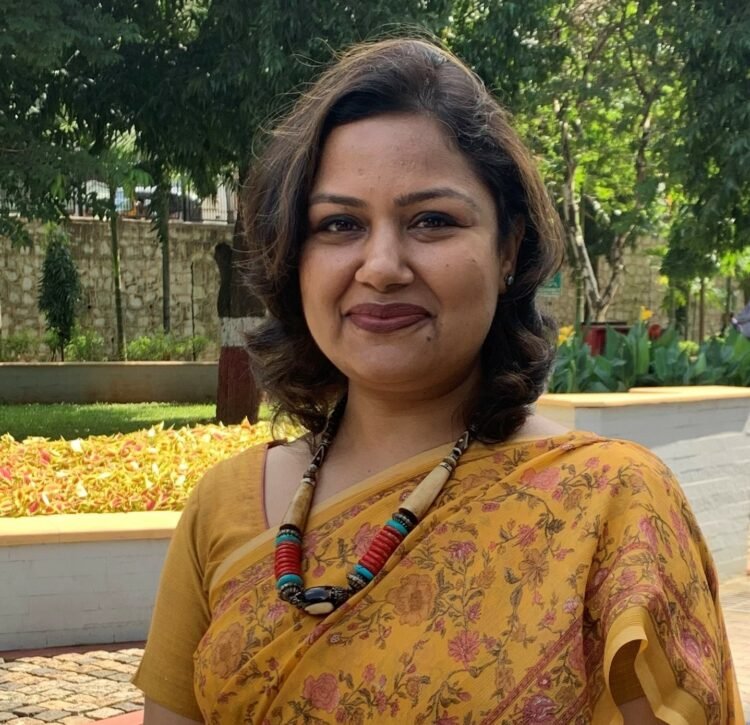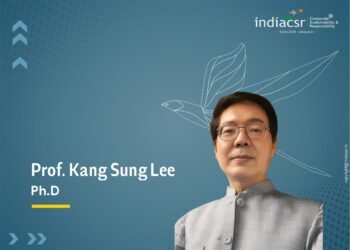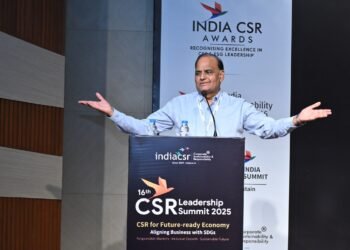LTI – Larsen & Toubro Infotech is an Indian global technology consulting and digital solutions Company. Shipra Sharma, Heads Corporate Social Responsibility (CSR) & Sustainability at LTI. In an interview with India CSR Network; Shipra Sharma shared her views and CSR and Sustainability best practices of the company. Excerpts of an interview:
What is the focus of Women Artisan Skill Enhancement Project undertaken by LTI?
As an ancient artform, Warli has its own essence of simplicity. It conveys stories of customs and traditions from a bygone era to which we owe the responsibilities of nurturing and revival. Many from the original Warli tribe have migrated or don’t practice the art anymore and as such, this rich tradition of thousands of years is nearing extinction.
Women are the anchors of society and play a key role in passing on tradition from one generation to the other. Encouraging them to participate in reviving the Warli art while also training and re-skilling them to be able to earn a livelihood in the process has been the core objective of the Women Artisan Skill Enhancement Project (WASEP).
We have been committed to creating sustainable solutions for the society as a business and through our CSR efforts. As a key player in this domain, we conceptualized this project targeting women from low-income communities.
As a part of this project, women artisans from urban communities are trained in finer techniques of Warli, which are then replicated on products customized for modern-day homes, followed by market linkages. It is a fresh perspective of interweaving Warli art with contemporary designs and handicraft products, thus creating a niche that provides these women with a self-sustaining livelihood opportunity.
Let us know about the key outcomes for the targeted community achieved by the initiative?
The program started in December 2017, with a target of reaching out to 2000 women within low-income communities in and around Mumbai. This has been possible due to the dedicated efforts of the project team and the determination of our women beneficiaries. We are now adding more product avenues to ensure a stable income for them as they have begun to earn good returns and growth opportunities from our market linkage initiatives such as corporate gifting, stalls in exhibitions, and online sales, thus making the program economically viable.
Over and above this, what makes us proud of these women artisans is when they come back to tell us stories of their enhanced social status in their family. They are now entrepreneurs, making a visible contribution to the family income, who can provide better education to their children. Some of our trainees have risen to become cluster leaders and trainers. Their tremendous leadership spirit is inspiring more and more women from their nearby communities to join the program.
As a part of our CSR project, it is encouraging that investing in the economic growth and skill enhancement of these women artisans has been the most effective means to drive progress on Gender Equality and No Poverty goals under the UN SDGs. The program has been receiving several recognitions on national and international levels for its unique and impactful model.
Let us know more about the online marketplace that you created specially for this initiative?
In this digitized world where most services are just a click away, there is still a large segment of small businesses that do not have access to the online marketplace. As an IT solutions provider, LTI tapped this opportunity to empower these women by providing adequate training to upload their products on e-commerce platforms. These mostly include clothing items, office stationery, home décor, and jewelry.
With COVID-19 affecting us all, the income of these women artisans too has been severely restricted. WASEP is executed in association with UNDP India and also involves grassroots NGOs who have a strong community connect. We co-created a platform to enable people pre-order the art products online and get the delivery after lockdown so the women could continue to get revenue from the sales.
From initially being a B2B e-commerce platform, the site was updated to create awareness on women artisans, their journeys, and success stories to create a demand for B2C purchases. Now people from across the country can extend their support by purchasing these products on ‘dishakruti.com’.
What were the challenges faced and how did you overcome them?
As a grassroots social impact program, the WASEP journey has been a series of exceptional and delightful episodes- right from the ideation stage to its implementation and to now experiencing a tangible impact. On the one hand, it has been about overcoming the emotional and societal barriers these women face in their homes and in their communities. On the other, it speaks volumes of their hard work and determination in overcoming them, thereby setting a positive trend for others to follow. It does take perseverance, both on their part and ours. However, one of the factors that facilitated this in all stages was customizing the program with a community-based learning model.
This meant that the women undergoing training were not required to travel and could balance their household chores. Trainers would come to the community and conduct the sessions allowing these women to bring their children along with them thus taking care of their younger ones while they pursued opportunities for a better livelihood. Detailed meetings were also held with their families to understand their concerns and addressing any apprehensions. These basic steps of providing a comfortable atmosphere for them has resulted in fewer dropouts and increased proficiency in a short time span.
What is the way ahead for this initiative?
LTI and UNDP have jointly released a report on ‘Reviving the Warli Art Form’. It is a narration of the multi-dimensional story of these women artisans and the steps we have undertaken to revive Warli. The report also aims to reach the voices of these women to various stakeholders who would like to join hands for this cause.
At LTI we find an interesting connection between Warli and the LTI Mosaic. Both comprise triangles to create a meaningful picture or pattern. Taking this essence forward along with our core belief of ‘Solving for Society’, WASEP will continue to resolve issues around culture, entrepreneurship and converging them to create comprehensive solutions. As a next step for the project, we are in the process of registering groups of women as producer organizations which will further formalize their finances, streamline their market linkage and eventually have a better measurable financial outcome. We hope to contribute to the SDGs seamlessly by replicating similar models of community development, globally.
What are the focus areas of L&T Infotech for its CSR?
LTI’s 1Step CSR program is focused on the 3Es: Education, Empowerment and Environment. Leveraging technology, our CSR efforts have created a multitude of opportunities for growth and prosperity, globally.
Aligned to the UN Sustainable Development Goals, we strive to enable students to learn better in classrooms, empower youth from low-income backgrounds to get better employment through digital training, and encouraging women to earn a livelihood through programs such as the WASEP. As a responsible corporate, we are also conscious of our carbon footprint. And, therefore, investing in green programs such as strategic tree plantations, renewable energy installations in rural schools and sustainable agriculture practices are also important to us. Through robust grassroots level, execution and employee volunteering spread across regions, we continue to focus on such pertinent social and environmental issues of local and global significance.
(CopyRight@IndiaCSRNetwork)






















